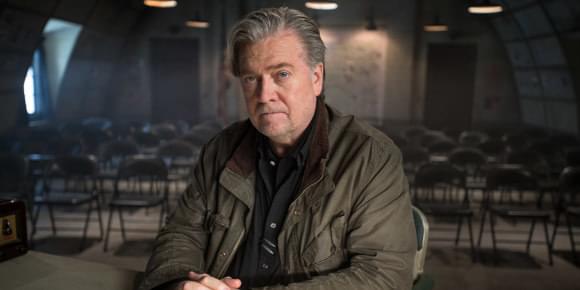43rd Toronto International Film Festival Coverage: Day Seven
Wednesday, September 12th, 2018 by Ian Evans

American Dharma courtesy of TIFF.
It’s day seven and things are starting to wind down a bit as I say goodbye to some of my friends from the U.S. press.
I started the day off with a screening of Damien Chazelle’s First Man, which stars Ryan Gosling as the first man on the moon, Neil Armstrong. Armstrong was known for his professionalism and keeping his emotions in check and Gosling portrays that part of him perfectly. Chazelle and his effects team also do a stellar job at portraying the launches and other spacecraft moments realistically. In today’s sci-fi fantasies we’re used to sleek, shiny spaceships with all the comforts of home and high-resolution displays. The Gemini and Apollo spacecraft were spartan tin cans strapped to massive rockets. Your smartphone has more computing power than the spacecraft that took men to the moon. They were relying on slide rules and calculations that had never been real-world tested because they were the ones testing them.
Chazelle captures the claustrophobic conditions, the bone-rattling shake of the engines and the massive thrust needed to complete the missions. The film also doesn’t shy away from the loss of life that these explorers faced in the whole space program and how that also affected the spouses. One of the strongest moments for Claire Foy, who plays Armstrong’s wife, is when she confronts the mission controllers after something goes awry. They try to brush her off with a “We’ve got it under control.” and she shoots back, “You’re a bunch of boys, you don’t have anything under control.”
During the space shuttle era, the public started becoming numb to spaceflight and launches stopped being shown live. First Man captures that time when a small group of very brave explorers risked everything to expand man’s horizons and the world sat on the edge of its seat.
My next screening was American Dharma, documentarian Errol Morris’ look at the controversial right-wing champion and former Trump advisor Steve Bannon. Bannon sees his worldview as a combination of duty, destiny and obligation. The doc uses the Gregory Peck film Twelve O’Clock High as a framework and setting as Bannon holds up the films of the 1940s and 1950s as helping to define the American myth. He talks about the hard-working man feeling shafted but Morris never pushes him to point out that that world didn’t have room for women, people of colour, Jews and Muslims or the LGBTQ community. We get to know Bannon’s views but never really get a clear understanding how he went from being an investment banker and movie producer to championing the alt-right at home and abroad. To some he’s the enemy, to others a hero but Morris ultimately fails to go deep into what makes the man tick beyond generating inflammatory click-bait headlines.